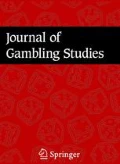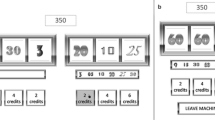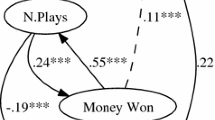Abstract
The present study assessed whether prior reinforcement experiences were related to gaming machine choice and the decision to change gaming machines during a session of gambling. Seventy undergraduate students (48 women, 22 men; mean age = 22.05 years) were presented with two visually identical simulated gaming machines in a practice phase. These simulated machines differed only in the rate of reinforcement. After the practice phase, participants were asked to choose a machine to play in the test phase and were allowed to change machines at will. Two measures of reinforcement were employed; frequency of wins and payback rate. Results indicated that neither measure of reinforcement was related to machine choice, but both were predictors of when participants changed machines. A post-hoc analysis of the 33 participants who changed machines during the test phase found a significant relationship between machine choice and prior reinforcement. For these participants, payback rate was significantly related to machine choice, unlike frequency of wins.
Similar content being viewed by others
References
Davey, G. (1989). Ecological learning theory. London: Routledge.
Delfabbro, P. H., & Winefield, A. H. (1999). Poker machine gambling. An analysis of within session characteristics. British Journal of Psychology, 90, 425–439.
Dickerson, M., & Baron, E. (2000). Contemporary issues and future directions for research into pathological gambling. Addiction, 95(8), 1145–1159.
Dickerson, M. G., Hinchy, J., England, S. L., Fabre, J., & Cunningham, R. (1992). On the determinants of persistent gambling I. High frequency poker machine players. British Journal of Psychology, 83, 237–248.
Dixon, M. R., MacLin, O. H., & Daugherty, D. (2006). An evaluation of response allocations to concurrently available slot machine simulations. Behavior Research Methods, 38(2), 232–236.
Dixon, M. R., & Schreiber, J. (2002). Using a computerized video poker simulation for the collection of experimental data on gambling behaviour. The Psychological Record, 52, 417–428.
Grant, J. E., & Kim, S. W. (2004). Gender differences. In J. Grant, & M. N. Potenza (Eds), Pathological gambling: A clinical guide to treatment (pp. 97–109). Washington, DC: American Psychiatric Publishing.
Griffiths, M. (1993). Fruit machine gambling: The importance of structural characteristics. Journal of Gambling Studies, 9(2), 101–120.
MacLin, O. H., Dixon, M. R., & Hayes, L. J. (1999). A computerized slot machine simulation to investigate the variable involved in gambling behavior. Behavior Research Methods, Instruments, & Computers, 31, 731–734.
Weatherly, J. N., & Brandt, A. E. (2004). Participants’ sensitivity to percentage payback and credit value when playing a slot-machine simulation. Behavior and Social Issues, 13, 33–50.
Author information
Authors and Affiliations
Corresponding author
Rights and permissions
About this article
Cite this article
Haw, J. The Relationship Between Reinforcement and Gaming Machine Choice. J Gambl Stud 24, 55–61 (2008). https://doi.org/10.1007/s10899-007-9073-5
Received:
Accepted:
Published:
Issue Date:
DOI: https://doi.org/10.1007/s10899-007-9073-5




